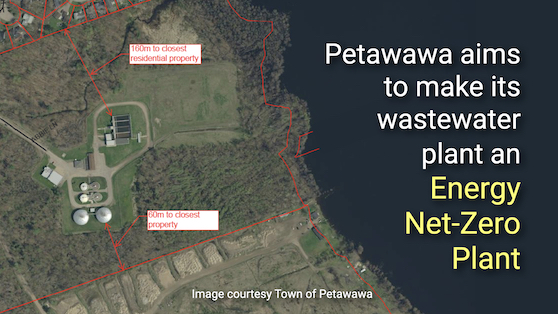
Cleantech
Features
News
News
Cleantech
Generation
News
Renewables
Petawawa aims to make its wastewater plant an “Energy Net-Zero Plant”
March 1, 2021 | By Anthony Capkun

March 1, 2021 – Ottawa is investing roughly $2.7 million from the Low Carbon Economy Fund to support a project in Petawawa, Ont., that converts food waste into energy.
The Town of Petawawa is also contributing $2.7 million to the project.
“The Town of Petawawa is committed to leading by example on climate change by transitioning the delivery of essential services in a way that reduces greenhouse gas emissions generated from our own biogas produced through wastewater operations,” said Bob Sweet, Mayor.
Sweet explained that the anaerobic digester technology at the existing wastewater treatment plant will be upgraded to a resource-recovery process.
Specifically, the project is described as upgrading the existing anaerobic digester technology to convert the Water Pollution Control Plant (WPCP) from its “traditional treatment-based process to a Resource Recovery process, achieving the goal of being an Energy Net-Zero Plant”.
The proposed project involves upgrading the plant’s existing anaerobic digester(s), improving the digestion efficiency of the WPCP sludge and allowing additional biosolids and organics (from food waste or fats, oils and grease) to be brought into WPCP from the town and neighbouring wastewater plants, as well as other biosolid producers (breweries, commercial, restaurants, etc.).
Biogas generated through the anaerobic digestion process would be used to produce renewable energy onsite through combined heat & power (CHP) engines “and other beneficial use of biogas”.
The funding will go toward increasing the production of biogas and help process more organic waste to generate electricity and supply energy to the wastewater plant. Over the life of this project, the town expects to see a cumulative reduction of about 300,000 tonnes of GHG emissions.
The project is also expected to divert 280,000 tonnes of food waste from landfill over the next 10 years.
Print this page